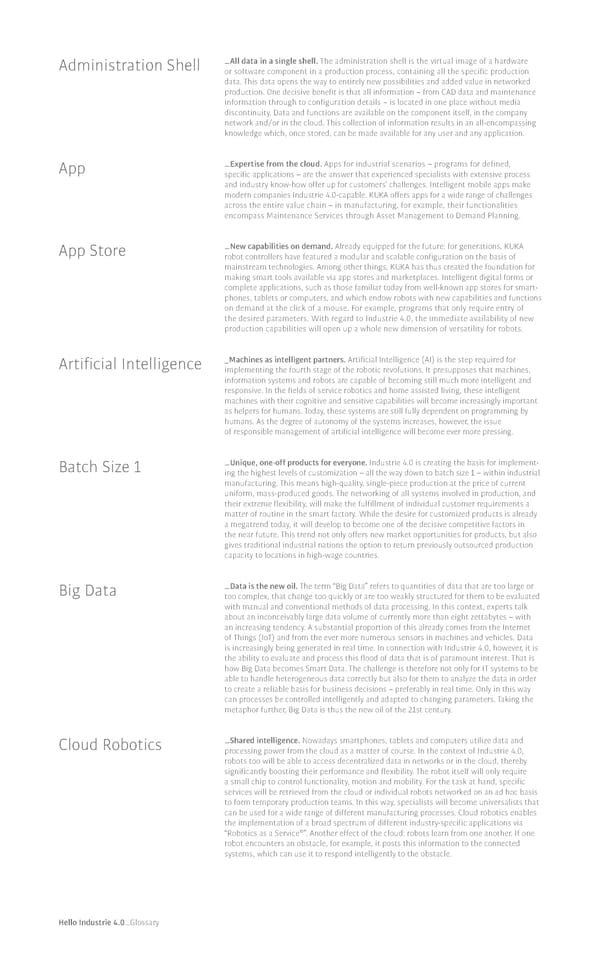Administration Shell �All data in a single shell. The administration shell is the virtual image of a hardware or software component in a production process, containing all the speci昀椀c production data. This data opens the way to entirely new possibilities and added value in networked production. One decisive bene昀椀t is that all information – from CAD data and maintenance information through to con昀椀guration details – is located in one place without media discontinuity. Data and functions are available on the component itself, in the company network and/or in the cloud. This collection of information results in an all-encompassing knowledge which, once stored, can be made available for any user and any application. App �Expertise from the cloud. Apps for industrial scenarios – programs for defined, specific applications – are the answer that experienced specialists with extensive process and industry know-how offer up for customers’ challenges. Intelligent mobile apps make modern companies Industrie 4.0-capable. KUKA offers apps for a wide range of challenges across the entire value chain – in manufacturing, for example, their functionalities encompass Maintenance Services through Asset Management to Demand Planning. App Store �New capabilities on demand. Already equipped for the future: for generations, KUKA robot controllers have featured a modular and scalable configuration on the basis of mainstream technologies. Among other things, KUKA has thus created the foundation for making smart tools available via app stores and marketplaces. Intelligent digital forms or complete applications, such as those familiar today from well-known app stores for smart- phones, tablets or computers, and which endow robots with new capabilities and functions on demand at the click of a mouse. For example, programs that only require entry of the desired parameters. With regard to Industrie 4.0, the immediate availability of new production capabilities will open up a whole new dimension of versatility for robots. Arti昀椀cial Intelligence _Machines as intelligent partners. Arti昀椀cial Intelligence (AI) is the step required for implementing the fourth stage of the robotic revolutions. It presupposes that machines, information systems and robots are capable of becoming still much more intelligent and responsive. In the 昀椀elds of service robotics and home assisted living, these intelligent machines with their cognitive and sensitive capabilities will become increasingly important as helpers for humans. Today, these systems are still fully dependent on programming by humans. As the degree of autonomy of the systems increases, however, the issue of responsible management of arti昀椀cial intelligence will become ever more pressing. Batch Size 1 �Unique, one-off products for everyone. Industrie 4.0 is creating the basis for implement- ing the highest levels of customization – all the way down to batch size 1 – within industrial manufacturing. This means high-quality, single-piece production at the price of current uniform, mass-produced goods. The networking of all systems involved in production, and their extreme flexibility, will make the fulfillment of individual customer requirements a matter of routine in the smart factory. While the desire for customized products is already a megatrend today, it will develop to become one of the decisive competitive factors in the near future. This trend not only offers new market opportunities for products, but also gives traditional industrial nations the option to return previously outsourced production capacity to locations in high-wage countries. Big Data �Data is the new oil. The term “Big Data” refers to quantities of data that are too large or too complex, that change too quickly or are too weakly structured for them to be evaluated with manual and conventional methods of data processing. In this context, experts talk about an inconceivably large data volume of currently more than eight zettabytes – with an increasing tendency. A substantial proportion of this already comes from the Internet of Things (IoT) and from the ever more numerous sensors in machines and vehicles. Data is increasingly being generated in real time. In connection with Industrie 4.0, however, it is the ability to evaluate and process this flood of data that is of paramount interest. That is how Big Data becomes Smart Data. The challenge is therefore not only for IT systems to be able to handle heterogeneous data correctly but also for them to analyze the data in order to create a reliable basis for business decisions – preferably in real time. Only in this way can processes be controlled intelligently and adapted to changing parameters. Taking the metaphor further, Big Data is thus the new oil of the 21st century. Cloud Robotics �Shared intelligence. Nowadays smartphones, tablets and computers utilize data and processing power from the cloud as a matter of course. In the context of Industrie 4.0, robots too will be able to access decentralized data in networks or in the cloud, thereby significantly boosting their performance and flexibility. The robot itself will only require a small chip to control functionality, motion and mobility. For the task at hand, specific services will be retrieved from the cloud or individual robots networked on an ad hoc basis to form temporary production teams. In this way, specialists will become universalists that can be used for a wide range of different manufacturing processes. Cloud robotics enables the implementation of a broad spectrum of different industry-specific applications via ® “Robotics as a Service ”. Another effect of the cloud: robots learn from one another. If one robot encounters an obstacle, for example, it posts this information to the connected systems, which can use it to respond intelligently to the obstacle. Hello Industrie 4.0�Glossary
 Embracing Industrie Page 91 Page 93
Embracing Industrie Page 91 Page 93